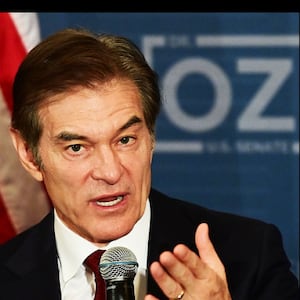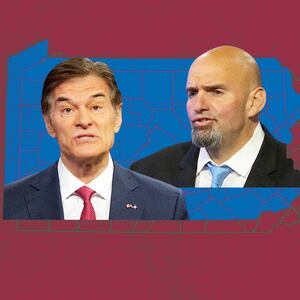John Fetterman’s campaign might be the first in history to unleash an October surprise on themselves. There’s a reason opponents wait until right before Election Day to drop opposition research: It’s devastating.
This week, we were treated to a clinic on why it’s better to get bad news out early and in small doses. By hiding the truth about the state of his condition following a devastating stroke last May, and pinning their hopes on an October 25 debate performance, Fetterman didn’t just jeopardize his campaign—or which party controls the U.S. Senate—he also cast a pall on the Democratic Party’s hopes just two weeks before the midterms.
Rather than being open and transparent, Fetterman’s campaign sought to stonewall the press, delay the inevitable, and criticize anyone who tried to question his fitness for office—or even expose the truth about his current condition.
You don’t have to go back far for examples. After NBC News’ Dasha Burns said on air that “it wasn’t clear” whether Fetterman was understanding her small talk before their official interview, Fetterman boosters fired back. One of them was Fetterman’s wife, Gisele Fetterman, who accused Burns of being “ableist,” and suggested there should be “consequences” for her words. “It was appalling to the entire disability community and I think to journalism,” she added.
Other members of the media also ran interference for Fetterman, including tech reporter and podcaster Kara Swisher, who took to Twitter to push back on Burns’ reporting.
Instead of attacking Burns, Team Fetterman and their enablers should have thanked her. In fact, the Fetterman campaign shouldn’t have waited until mid-October to expose the truth about their candidate’s condition—nor should they have insisted on just one debate in late October.
Don’t take my word for it. During the October 14 episode of The Dispatch Podcast, Sarah Isgur, a former GOP campaign operative, foreshadowed this outcome, arguing that Fetterman’s team should have held background briefings with reporters so they could become familiar with his condition, adding: “I would have flooded the zone with on-camera interviews.” Isgur likewise suggested Fetterman’s team should have scheduled “six debates,” because “having one debate means everybody will tune in—and it will be only potentially the second time they will have seen Fetterman take questions.”
Fetterman’s team handled the situation in exactly the opposite way. What is more, rather than accepting responsibility after the debacle, Fetterman’s campaign blamed the captioning system for Fetterman’s performance. And they still won’t commit to releasing his medical records.
So why did this happen?
It’s possible that this was a calculated and cynical ploy. The October 25 debate date meant that some Pennsylvania voters would already have cast their ballots (another reason I’m not keen on early voting). If that was the calculus, I’m not sure the pros outweighed the cons. So what else might explain this otherwise irrational choice?
First, I think it’s in our human nature to want to cover up things (going all the way back to the Garden of Eden). This strategy is almost always a mistake, particularly when the thing you’re trying to hide is bound to come out eventually. When that’s the case, it’s smarter to (a) get the facts out early so that it becomes old news, and (b) bring it out yourself—so that you can frame it in the best possible light. “When in doubt,” the saying goes, “get it out.”
Imagine a scenario where Fetterman’s campaign is more proactive and does that NBC News interview in mid-August, instead of mid-October. This could have been an opportunity for Fetterman to demonstrate that, despite an impairment, he could function as a U.S. senator. He could have taken this situation and used it to become something of a heroic activist for people struggling to overcome disabilities.
This scenario might have also given Fetterman an excuse to say, “Debates have become nothing but a reality show. That’s why I want to do a series of interviews,” or something similar.
Instead, Fetterman’s team did the scummy thing. They stonewalled the press. They relied on a pliant media. They shamed skeptics. It worked until it didn’t.
Now, it’s possible that Fetterman thought he’d be better by now. That he could fake it till he made it. Maybe he feared he’d be replaced on the ticket. Maybe he thought his fundraising would dry up. None of these scenarios paint a flattering picture.
While Fetterman’s campaign is guilty of malpractice, their accomplices in the media also deserve some blame.
After the debate, conservative commentator Meghan McCain tweeted that “If Fetterman were a GOPer, his campaign would be over.” Once upon a time, I think that would have been true. Today, however, Herschel Walker’s existence as a Republican candidate, supported wholly by the GOP establishment, makes that a harder sell. What is true, however, is that the mainstream media would have been calling for Fetterman to drop out of the race if he were a Republican. But here’s the thing: That might have been good for Democrats.
In today’s world, Democrats are often (ironically) cursed by having friendly press coverage. This lack of accountability creates a false sense of reality. Instead of believing they could effectively run out the clock, the Fetterman campaign would have been better served by a press who forced their candidate’s problems into the open.
Instead, by tapdancing around the issue and accepting the campaign’s stonewalling, the mainstream media generally (with a few exceptions) lulled him to a disastrous place.
After a year of leading in the polls, his status as the frontrunner is in jeopardy. Now that it’s crunch time, his campaign could fracture and implode.
It’s always the cover-up that gets you.










